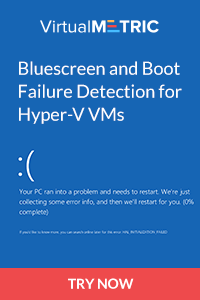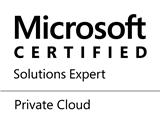
Categories

Sponsors


Archive
 Blogroll 
Badges


Community

|
Posted in Virtual Machine Manager | No Comment | 5,280 views | 20/02/2009 17:00
Yine ilginç bir hata daha. SCVMM üzerinde Windows 2003 Web Edition template’i oluştururken aşağıdaki hatayı aldım. Zaten bir aydır düzgün çalışan bir W2K3 template’i yapabilmiş değilim. Muhtemelen SCVMM’de bir hata var. Çünkü W2K8 sorunsuz çalışıyor. Warning (2912)
An internal error has occurred trying to contact an agent on the hyperv02.fabrikam.contoso.net server. (The directory is not empty (0x80070091)) Recommended Action Yukardaki hata muhtemelen, C:\sysprep klasörünün yaratılmış ve dolu olmasından kaynaklanıyor. Bu sefer de o şekilde denemeyi istedim. Yalnız içersindeki .inf dosyasını sildim. SCVMM’in customize yapması için uğraşıp duruyorum anlayacağınız. Bakalım neler olacak..
Posted in Virtual Machine Manager, Windows Powershell | No Comment | 2,747 views | 20/02/2009 16:19
SCVMM powershell konsolu üzerinden aşağıdaki komutla hangi işletim sistemlerinin template’lerini oluşturabileceğinizi öğrenebilirsiniz.
İşte yukardaki komut sonrası Powershell konsoluna dönen işletim sistemleri: 64-bit edition of Windows Server 2008 Datacenter
64-bit edition of Windows Server 2008 Enterprise 64-bit edition of Windows Server 2008 Standard 64-bit edition of Windows Vista Windows 2000 Advanced Server Windows 2000 Server Windows Server 2003 Datacenter Edition (32-bit x86) Windows Server 2003 Datacenter x64 Edition Windows Server 2003 Enterprise Edition (32-bit x86) Windows Server 2003 Enterprise x64 Edition Windows Server 2003 Standard Edition (32-bit x86) Windows Server 2003 Standard x64 Edition Windows Server 2003 Web Edition Windows Server 2008 Datacenter 32-Bit Windows Server 2008 Enterprise 32-Bit Windows Server 2008 Standard 32-Bit Windows Small Business Server 2003 Windows Vista Windows Web Server 2008 Windows XP 64-Bit Edition Windows XP Professional Görebileceğiniz gibi listede hiç Linux işletim sistemi yok. Bu durumda aklınıza “Hani Hyper-V, Suse Ent. destekliyordu?” sorusu gelebilir. Microsoft, Suse’ye Hyper-v üzerinden destek verse de SCVMM üzerinden Customize desteği vermiyor demek ki :)
Posted in Virtual Machine Manager, Windows Powershell | No Comment | 9,751 views | 17/02/2009 20:15
You can store a vds account in library server on SCVMM with this Powershell commands:
We used “Localhost” but if you have another SCVMM and if you want to store vds in that host, you should use it like vmm02.fabrikam.contoso.net.
Posted in Virtual Machine Manager, Windows Powershell | No Comment | 2,253 views | 17/02/2009 20:10
There is an easy way to suspend a vds account on SCVMM with Powershell.
As you see, first we saved vds then changed the owner. So user can not resume vds. Also this is resume part:
You should use Start-VM command to resume vds. In here, Fabrikam is our Domain Sam Name.
Posted in Virtual Machine Manager, Windows Powershell | No Comment | 2,182 views | 17/02/2009 20:02
Kullanıcıyı owner olarak atamakta kullandığınız kullanıcı rolünü, aşağıdaki komut ile powershell üzerinden kaldırabilirsiniz.
$RemoveRole’deki Get-VMMUserRole’ün önemli bir yeri var orada. Bu şekilde yapmazsanız, hata alacaksınız. Bilgilerinize..
Posted in Virtual Machine Manager, Windows Powershell | No Comment | 3,454 views | 17/02/2009 19:59
You can remove/delete your user role with this command:
You should use Get-VMMUserRole command to use Remove-VMMUserrole command.
Posted in Virtual Machine Manager, Windows Powershell | No Comment | 2,531 views | 16/02/2009 02:29
Powershell üzerinden VM oluştururken, işletim sistemi şifresi belirtmek istediğinizde, password ile ilgili hata alabilirsiniz. Bu sorunu çözmek için clear haldeki şifrenizi önce SecureString haline getirip, sonra System.Management.Automation.PSCredential haline getirmeniz gerekiyor.
New-VM komutu içersine -AdminPasswordCredential argümanını ekleyerek, işletim sistemi şifresini belirleyebilirsiniz. Kolay gelsin. |











